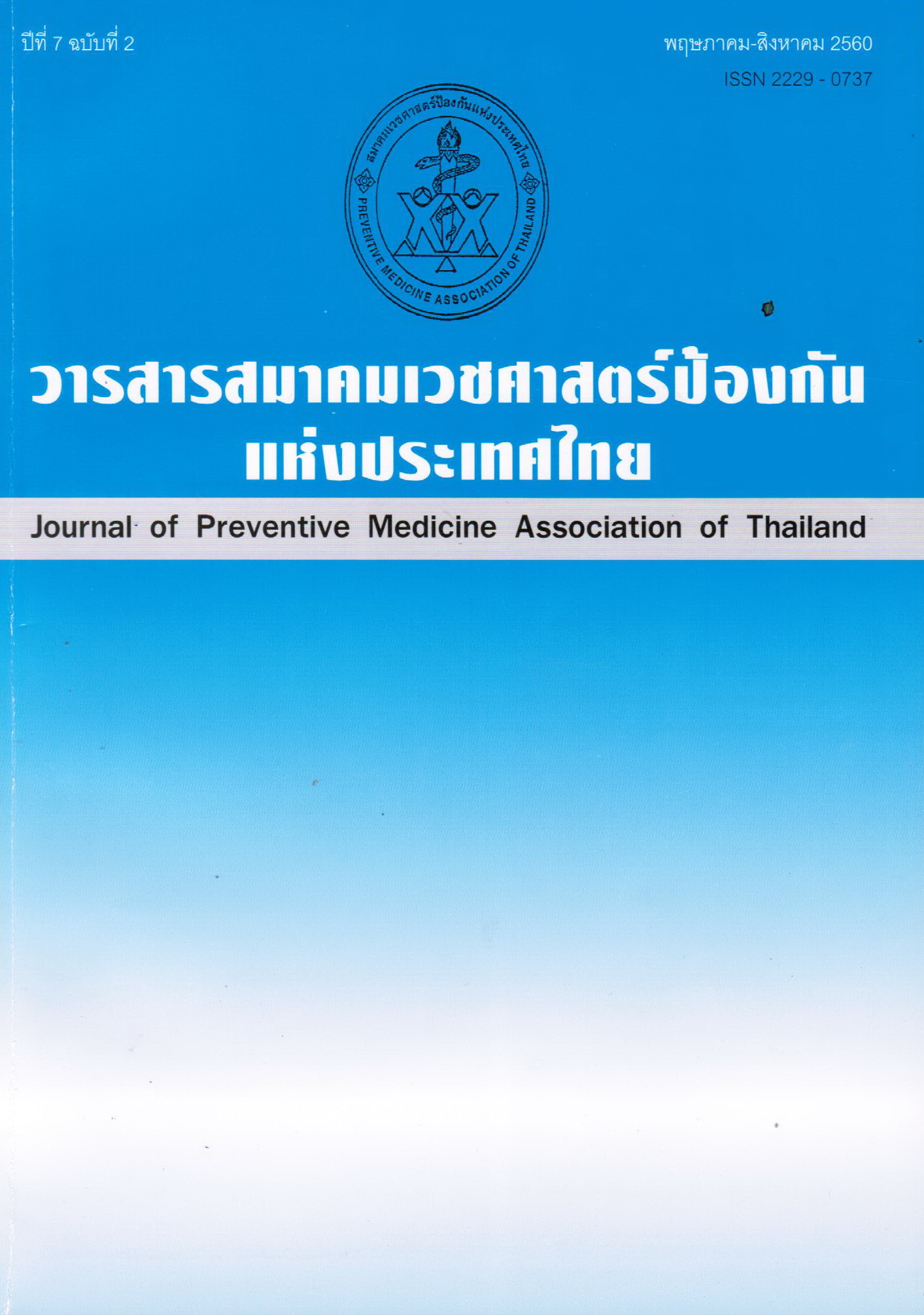Development of Diabetes Care System in a Network of Primary Care Unit Under the Context Rural District, Yangsisurat District, Mahasarakham Province
Keywords:
system, diabetes, PCUAbstract
This Action research aims to develop a care system of diabetes in primary care unit and evaluate of diabetes care system in primary care unit at Yangsisurat district. Method in this study had 4 phases (July 2015-April 2017) in which care system is developed by PCU Multi-disciplinary teams in hospitals and primary care, volunteers, diabetic representatives and government representatives for a total of 72 people. Evaluation of a develop care system is by the proportion of patients with diabetes (hospital: PCU.), repatriation of patients, patients without appointments dropped, evaluated NCD Clinic, a satisfaction in multidisciplinary team and diabetes-specific options. The sample size of diabetes was calculated from Yamane and the proportion of patients each PCU, 277
people. Data Analysis by quantitative data are descriptive statistics such as mean, standard deviation, percent data and qualitative data are content analysis and triangulation data. The results showed that the development system is done by. 1) Development of a participatory management with supervision, monitoring of the network and budget accordingly 2) Human resource development each competency-based professional 3) Expanding the service for 8
PCU of a multidisciplinary team. 4) Design care system by medical consultation through mentors, Clinical Practice Guidelines (CPG) and care models in the same network by case management to all areas, 5) Other support that to develop a centralized central supply, requisition process-reserve medicine and transportation, development of information systems and networks. Evaluation of a care system of diabetes showed that the proportion of outpatient
diabetes (hospital: PCU) from 70: 30 to 45: 55, patients with out appointments dropped from 12.25% to 2.32%, repatriation of patients decreased from 22.25% to 10.20%, the multidisciplinary team satisfaction at the high level (=4.50, SD=0.54), the patients satisfaction at the high level (
=4.59, SD=0.53) and evaluated NCD Clinic are excellent level 25% and good level 75%. Conclusion is that the development of diabetes patients in primary care unit is consistent with
the context of their participation which resulted in more patients access care. Patients and multidisciplinary team are satisfied.
References
2. สุภัทร ฮาสุวรรณกิจ. การบริหารจัดการเครือข่ายหน่วยบริการสุขภาพปฐมภูมิ. นนทบุรี: นโมพริ้นติ้งแอนด์พับลิชชิง ; 2550.
3. เดชา แซ่หลี และคณะ. การขับเคลื่อนระบบสุขภาพระดับอำเภอ (รอส.). กรุงเทพมหานคร: สำนักพัฒนาระบบบริการสุขภาพ กรมสนับสนุนบริการสุขภาพ; 2557.
4. โรงพยาบาลยางสีสุราช. รายงาน NCD ของสถานบริการสาธารณสุข เครือข่ายบริการสุขภาพยางสีสุราช ปี 2554-2556. มหาสารคาม: โรงพยาบาลยางสีสุราช; 2557.
5. Coleman K., Austin B.T., Wagner E.H., & Brach C. (2009). Evidence on the Chronic Care Model in the new millennium. Health Affairs, 2009: 28(1):75-85.
6. บุญชม ศรีสะอาด. การวิจัยเบื้องต้น. กรุงเทพมหานคร : สุวีริยาสาส์น; 2553.
7. พันธุ์ทิพย์ รามสูต. การวิจัยปฏิบัติการแบบมีส่วนร่วม. สถาบันพัฒนาการสาธารณสุขอาเซียน มหาวิทยาลัยมหิดล. กรุงเทพมหานคร: พี เอ ลีฟวิ่ง; 2540.
8. ทวีศักดิ์ นพเกสร. วิธีการวิจัยเชิงคุณภาพเล่ม 2. พิมพ์ครั้งที่ 2. นครราชสีมา: โรงพิมพ์โชคเจริญ มาร์เก็ตติ้ง; 2549.
9. ปราโมทย์ บุญเจียร. การพัฒนาระบบบริการเครือข่ายปฐมภูมิ อำเภอเมือง จังหวัดเลย. วารสารสมาคมเวชศาสตร์ป้องกันแห่งประเทศไทย 2559;6:38-48.
10. กอบกุล ยศณรงค์. การพัฒนาระบบการดูแลผู้ป่วยเบาหวานดูแลผู้ป่วยเบาหวานสู่ระบบบริการระดับปฐมภูมิ ในเครือข่ายบริการสุขภาพ อ.ปัว จ.น่าน. วารสารวิจัยระบบสาธารณสุข 2555;6:290-297.
11. ดารณี เทียมเพ็ชร์, กศิมา สง่ารัตนพิมาน, มัญฑิตา อักษรดี, เพ็ญพร ทวีบุตร, วรเดช ช้างแก้ว. การพัฒนาระบบการดูแลผู้ป่วยเบาหวานลงสู่ชุมชน แบบไร้รอยต่อ อำเภอเมือง จังหวัดสระแก้ว. วารสารพยาบาล กระทรวงสาธารณสุข 2555;6:156-169.
Downloads
Published
How to Cite
Issue
Section
License
บทความที่ลงพิมพ์ในวารสารเวชศาสตร์ป้องกันแห่งประเทศไทย ถือเป็นผลงานวิชาการ งานวิจัย วิเคราะห์ วิจารณ์ เป็นความเห็นส่วนตัวของผู้นิพนธ์ กองบรรณาธิการไม่จำเป็นต้องเห็นด้วยเสมอไปและผู้นิพนธ์จะต้องรับผิดชอบต่อบทความของตนเอง






